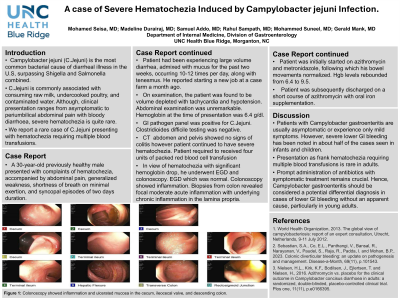Tuesday Poster Session
Category: GI Bleeding
P4194 - A Case of Severe Hematochezia Induced by Campylobacter jejuni Infection
Tuesday, October 29, 2024
10:30 AM - 4:00 PM ET
Location: Exhibit Hall E

Has Audio
- MS
Mohamed O. Seisa, MD
UNC Health Blue Ridge
Morganton, NC
Presenting Author(s)
Mohamed O. Seisa, MD, Madeline Durairaj, MD, Samuel Addo, MD, Rahul Sampath, MD, Suneel Mohammed, MD
UNC Health Blue Ridge, Morganton, NC
Introduction: Campylobacter jejuni (C.Jejuni) is the most common bacterial cause of diarrheal illness in the U.S, surpassing Shigella and Salmonella combined. It is commonly associated with consuming raw milk, undercooked poultry, and contaminated water. Although, clinical presentation ranges from asymptomatic to periumbilical abdominal pain with bloody diarrhoea, severe hematochezia is quite rare. We report a rare case of C.Jejuni presenting with hematochezia requiring multiple blood transfusions.
Case Description/Methods: A 30-year-old previously healthy male presented with complaints of hematochezia, accompanied by abdominal pain, generalized weakness, shortness of breath on minimal exertion, and syncopal episodes of two days duration. He had been experiencing large volume diarrhea, admixed with mucus for the past two weeks,occurring 10-12 times per day, along with tenesmus. He reported starting a new job at a case farm a month ago. On examination, the patient was found to be volume depleted with tachycardia and hypotension. Abdominal examination was unremarkable. Hemoglobin at the time of presentation was 6.4 g/dl. Other labs were unremarkable. GI pathogen panel was positive for C.Jejuni. Clostridioides difficile testing was negative. CT abdomen and pelvis showed no signs of colitis. In view of hematochezia with significant hemoglobin drop, he underwent EGD which was normal. Colonoscopy showed inflammation and ulcerated mucosa involving the cecum, ileocecal valve, and descending colon. Biopsies from colon revealed focal moderate acute inflammation with underlying chronic inflammation in the lamina propria. He received four units of packed red blood cell transfusion during the course of hospitalization. He was initially started on azithromycin and metronidazole, following which his bowel movements normalized. Hgb levels rebounded from 6.4 to 9.5. He was subsequently discharged on a short course of azithromycin with oral iron supplementation.
Discussion: Patients with Campylobacter gastroenteritis are usually asymptomatic or experience only mild symptoms. However, severe lower GI bleeding has been noted in about half of the cases seen in infants and children. Presentation as frank hematochezia requiring multiple blood transfusions is rare in adults. Prompt administration of antibiotics with symptomatic treatment remains crucial.Hence, Campylobacter gastroenteritis should be considered a potential differential diagnosis in cases of lower GI bleeding without an apparent cause, particularly in young adults.

Disclosures:
Mohamed O. Seisa, MD, Madeline Durairaj, MD, Samuel Addo, MD, Rahul Sampath, MD, Suneel Mohammed, MD. P4194 - A Case of Severe Hematochezia Induced by </i>Campylobacter jejuni</i> Infection, ACG 2024 Annual Scientific Meeting Abstracts. Philadelphia, PA: American College of Gastroenterology.
UNC Health Blue Ridge, Morganton, NC
Introduction: Campylobacter jejuni (C.Jejuni) is the most common bacterial cause of diarrheal illness in the U.S, surpassing Shigella and Salmonella combined. It is commonly associated with consuming raw milk, undercooked poultry, and contaminated water. Although, clinical presentation ranges from asymptomatic to periumbilical abdominal pain with bloody diarrhoea, severe hematochezia is quite rare. We report a rare case of C.Jejuni presenting with hematochezia requiring multiple blood transfusions.
Case Description/Methods: A 30-year-old previously healthy male presented with complaints of hematochezia, accompanied by abdominal pain, generalized weakness, shortness of breath on minimal exertion, and syncopal episodes of two days duration. He had been experiencing large volume diarrhea, admixed with mucus for the past two weeks,occurring 10-12 times per day, along with tenesmus. He reported starting a new job at a case farm a month ago. On examination, the patient was found to be volume depleted with tachycardia and hypotension. Abdominal examination was unremarkable. Hemoglobin at the time of presentation was 6.4 g/dl. Other labs were unremarkable. GI pathogen panel was positive for C.Jejuni. Clostridioides difficile testing was negative. CT abdomen and pelvis showed no signs of colitis. In view of hematochezia with significant hemoglobin drop, he underwent EGD which was normal. Colonoscopy showed inflammation and ulcerated mucosa involving the cecum, ileocecal valve, and descending colon. Biopsies from colon revealed focal moderate acute inflammation with underlying chronic inflammation in the lamina propria. He received four units of packed red blood cell transfusion during the course of hospitalization. He was initially started on azithromycin and metronidazole, following which his bowel movements normalized. Hgb levels rebounded from 6.4 to 9.5. He was subsequently discharged on a short course of azithromycin with oral iron supplementation.
Discussion: Patients with Campylobacter gastroenteritis are usually asymptomatic or experience only mild symptoms. However, severe lower GI bleeding has been noted in about half of the cases seen in infants and children. Presentation as frank hematochezia requiring multiple blood transfusions is rare in adults. Prompt administration of antibiotics with symptomatic treatment remains crucial.Hence, Campylobacter gastroenteritis should be considered a potential differential diagnosis in cases of lower GI bleeding without an apparent cause, particularly in young adults.

Figure: Colonoscopy findings
Disclosures:
Mohamed Seisa indicated no relevant financial relationships.
Madeline Durairaj indicated no relevant financial relationships.
Samuel Addo indicated no relevant financial relationships.
Rahul Sampath indicated no relevant financial relationships.
Suneel Mohammed indicated no relevant financial relationships.
Mohamed O. Seisa, MD, Madeline Durairaj, MD, Samuel Addo, MD, Rahul Sampath, MD, Suneel Mohammed, MD. P4194 - A Case of Severe Hematochezia Induced by </i>Campylobacter jejuni</i> Infection, ACG 2024 Annual Scientific Meeting Abstracts. Philadelphia, PA: American College of Gastroenterology.
